In the heart of Providence’s Jewelry District, a significant transformation is underway with the development of Ocean State Labs, the state’s inaugural life sciences incubator. This initiative represents a major step forward in Rhode Island’s ambitions to become a pivotal player in the biotechnology sector. The incubator is a key project spearheaded by the Rhode Island Life Science Hub, a quasi-state agency established to foster growth in the biotech industry through collaborations between public and private sectors. Located on the fourth floor of a new building at 150 Richmond Street, which will also house a State Health Lab, Ocean State Labs aims to provide essential resources for startups to cultivate their ideas and technologies.
The planning and construction for Ocean State Labs came to fruition with significant financial backing. The state government allocated $45 million in federal pandemic relief funds to the Life Sciences Hub, which is investing $9 million directly into the incubator project. Furthermore, the 195 Redevelopment District Commission contributed an additional $1 million. As emphasized by both Neil Steinberg, chair of the Life Sciences Hub, and Marc Crisaffulli, chair of the 195 Commission, these investments are not merely budgetary decisions but vital long-term commitments crucial for Rhode Island’s economic future. They underline the importance of consistent support in fostering innovation and growth within the life sciences field, especially in the face of escalating budget challenges.
The development of Ocean State Labs aligns with a broader movement in Providence to bolster life sciences research and development. In proximity to the incubator, Brown University is constructing a substantial 300,000-square-foot research facility dedicated to life sciences. The collaboration between Brown and Ocean State Labs enhances the ecosystem for biotech innovation in the region. With Brown leasing space in the same building, the university is effectively allowing Ocean State Labs to use 30,000 square feet at no charge, valuing the arrangement at approximately $13 million over a decade. This kind of partnership exemplifies the synergistic relationships forming within the local biotech community, which are essential for fostering a collaborative environment conducive to innovation.
Financial contributions from both the Life Sciences Hub and the redevelopment commission are earmarked to cover the necessary build-out and equipment for the incubator. Ancora, the developer behind the building, will be responsible for staffing the labs, ensuring that the incubator not only launches but also operates effectively as a resource for biotechnological development. The estimated timeline for the facility to start yielding tangible benefits is projected within two to five years, as noted by House Speaker K. Joseph Shekarchi. These early returns are crucial, as incubators generally take time to incubate and nurture emerging companies, ultimately leading to the development and introduction of novel therapies and biotechnological advancements.
The establishment of Ocean State Labs marks an important milestone for Rhode Island’s biotechnology landscape, providing a dedicated space for startups to innovate and grow. The presence of the incubator, in tandem with Brown University’s research facility, signals to both local and national stakeholders that Rhode Island is serious about leveraging its resources and talent to spur biotech innovation. This nurturing environment is anticipated to attract more biotech firms and professionals to the region, enhancing Rhode Island’s standing as a competitive player in the life sciences sector.
Ultimately, the vision laid out for Ocean State Labs underlines a strategic effort by state leaders to capitalize on a growing industry. The collaborative framework established through the Life Sciences Hub and strategic partnerships illustrates a commitment to not only emerging companies but also long-term economic growth for the state. As Rhode Island embarks on this transformative journey in biotechnology, the interactions and investments made today are poised to lay the groundwork for a thriving ecosystem that supports innovation, attracts talent, and promotes health advancements that could benefit society as a whole.

